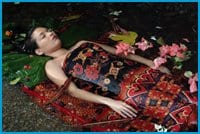Indigenous director Kanakan Balintagos (aka Auraeus Solito), whose 2005 film The Blossoming Of Maximo Oliveros played ImagineNative and other international film festivals to great acclaim, returns to ImagineNative for the festival’s opening gala with his new feature, Tuli.
Instead of Blossoming’s girly-boy on the streets of Manila, Tuli follows a strong, young woman in the lush Philippine countryside. Daisy (Desiree Del Valle) is the daughter of the village circumciser, Ka Malteng (Bembol Roco), who is prone to drunken rages where he becomes physically and verbally abusive toward his poor wife and daughter.
The film begins with a bold series of scenes that methodically follows Ka Malteng and a reluctant Daisy as they usher four young boys through circumcision. Years later, bitter about his own arranged marriage, Ka Malteng intends his daughter to marry one of these boys, who regularly serenade her beneath her windowsill. But it soon becomes apparent that she has other plans in mind. After her good friend Botchok (Vanna Garcia) is left by her fickle new spouse, Daisy takes her in and proposes that they marry each other instead, in protest of the ignorance and cruelty of the local men. “Let’s show the men here that our universe doesn’t revolve around their balls.”
Meanwhile, a boy named Nanding (Carlo Aquino) is instructed by his shaman grandmother how to obtain mystic powers from a banana blossom on Good Friday; this young fellow outsider is eventually chosen by Daisy to father her and Botchok’s child.
Balintagos’s keen eye for the sexual and religious tensions and conflicts of the Catholic village results in memorable scenes such as a fantastic Passion Play where Nanding-as-Christ is revealed to be uncircumcised (the only such man in the village) and Daisy’s baking of round yonic buns, more delicious than the long phallic ones her father produces. Unfortunately, they don’t sell since the villagers believe they have been hexed by the lesbians.
Bathed in a warm golden brown hue, Tuli is atmospheric and appealing, but at 113 minutes, often slow. The characterization is quite one-dimensional, while the romantic relationship between Daisy and Botchok comes out of nowhere and sometimes seems to be just giggly, teenage rebellion. Despite these concerns, Tuli is an intimate and imaginative story of young underdogs who challenge the order of their village.


 Why you can trust Xtra
Why you can trust Xtra


